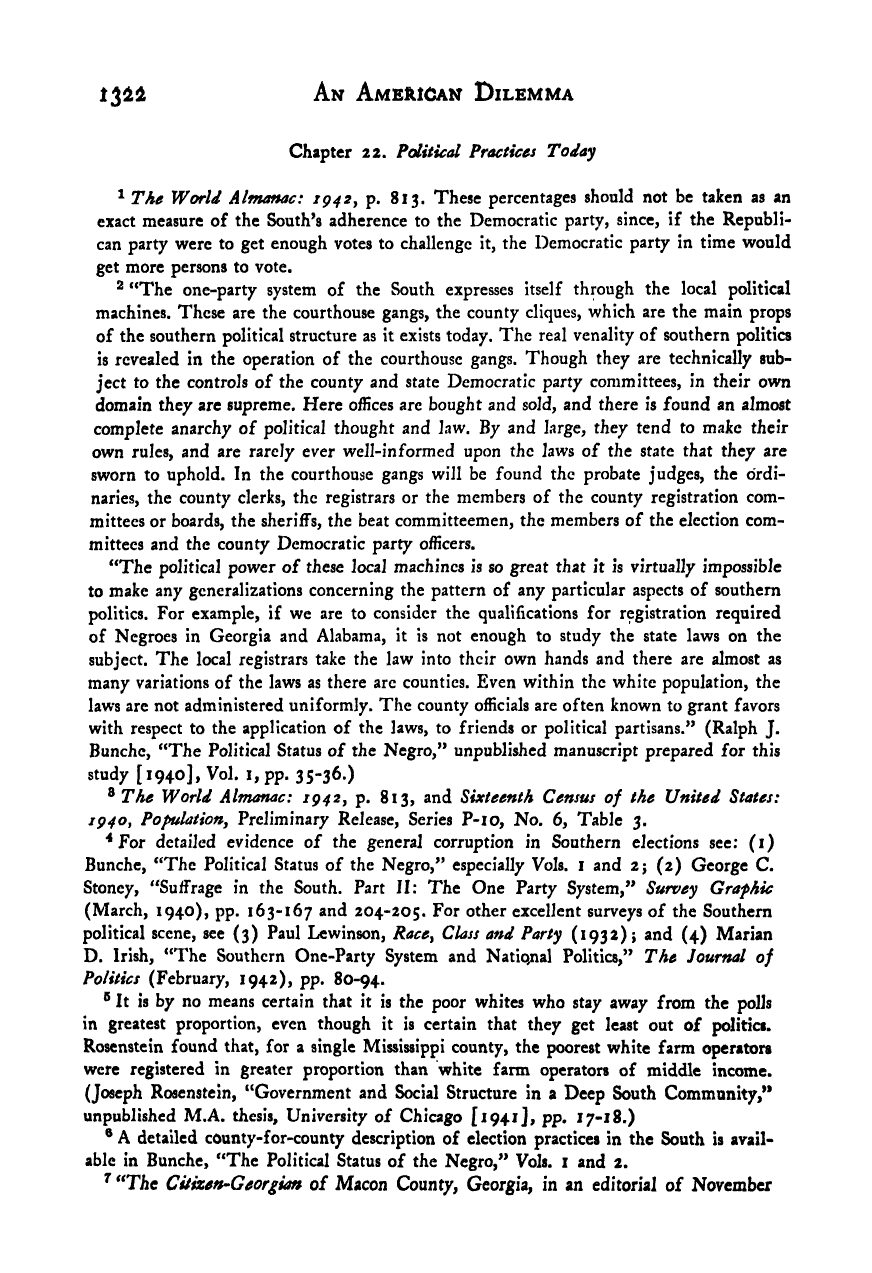Note: Gunnar Myrdal died in 1987, less than 70 years ago. Therefore, this work is protected by copyright, restricting your legal rights to reproduce it. However, you are welcome to view it on screen, as you do now. Read more about copyright.
Full resolution (TIFF) - On this page / på denna sida - Footnotes - Chapter 22

<< prev. page << föreg. sida << >> nästa sida >> next page >>
Below is the raw OCR text
from the above scanned image.
Do you see an error? Proofread the page now!
Här nedan syns maskintolkade texten från faksimilbilden ovan.
Ser du något fel? Korrekturläs sidan nu!
This page has never been proofread. / Denna sida har aldrig korrekturlästs.
An American Dilemma
Chapter 22. Political Practices Today
^ The World Almanac: 1942^ p. 813. These percentages should not be taken as an
exact measure of the South’s adherence to the Democratic party, since, if the Republi-
can party were to get enough votes to challenge it, the Democratic party in time would
get more persons to vote.
^
“The one-party system of the South expresses itself through the local political
machines. These are the courthouse gangs, the county cliques, which are the main props
of the southern political structure as it exists today. The real venality of southern politics
is revealed in the operation of the courthouse gangs. Though they are technically sub-
ject to the controls of the county and state Democratic party committees, in their own
domain they are supreme. Here offices are bought and sold, and there is found an almost
complete anarchy of political thought and law. By and large, they tend to make their
own rules, and are rarely ever well-informed upon the laws of the state that they are
sworn to uphold. In the courthouse gangs will be found the probate judges, the ordi-
naries, the county clerks, the registrars or the members of the county registration com-
mittees or boards, the sheriffs, the beat committeemen, the members of the election com-
mittees and the county Democratic party officers.
“The political power of these local machines is so great that it is virtually impossible
to make any generalizations concerning the pattern of any particular aspects of southern
politics. For example, if we are to consider the qualifications for registration required
of Negroes in Georgia and Alabama, it is not enough to study the state laws on the
subject. The local registrars take the law into their own hands and there are almost as
many variations of the laws as there are counties. Even within the white population, the
laws are not administered uniformly. The county officials are often known to grant favors
with respect to the application of the laws, to friends or political partisans.” (Ralph J.
Bunche, “The Political Status of the Negro,” unpublished manuscript prepared for this
study [1940], Vol. I, pp. 35-36.)
^ The World Almanac: 1942, p. 813, and Sixteenth Census of the United States:
1940, Population, Preliminary Release, Series P-io, No. 6, Table 3.
^ For detailed evidence of the general corruption in Southern elections see; (i)
Bunche, “The Political Status of the Negro,” especially Vols. i and 2; (2) George C.
Stoney, “Suffrage in the South. Part II; The One Party System,” Survey Graphic
(March, 1940), pp. 163-167 and 204-205. For other excellent surveys of the Southern
political scene, see (3) Paul Lewinson, Race, Class and Party (1932); and (4) Marian
D. Irish, “The Southern One-Party System and Natiqnal Politics,” The Journal of
Politics (February, 1942), pp. 80-94.
® It is by no means certain that it is the poor whites who stay away from the polls
in greatest proportion, even though it is certain that they get least out of politics.
Rosenstein found that, for a single Mississippi county, the poorest white farm operators
were registered in greater proportion than white farm operators of middle income.
(Joseph Rosenstein, “Government and Social Structure in a Deep South Community,”
unpublished M.A. thesis. University of Chicago [1941J, pp. 17-18.)
® A detailed county-for-county description of election practices in the South is avail-
able in Bunche, “The Political Status of the Negro,” Vols. i and 2.
^
“The Citizen-Georgian of Macon County, Georgia, in an editorial of November
<< prev. page << föreg. sida << >> nästa sida >> next page >>